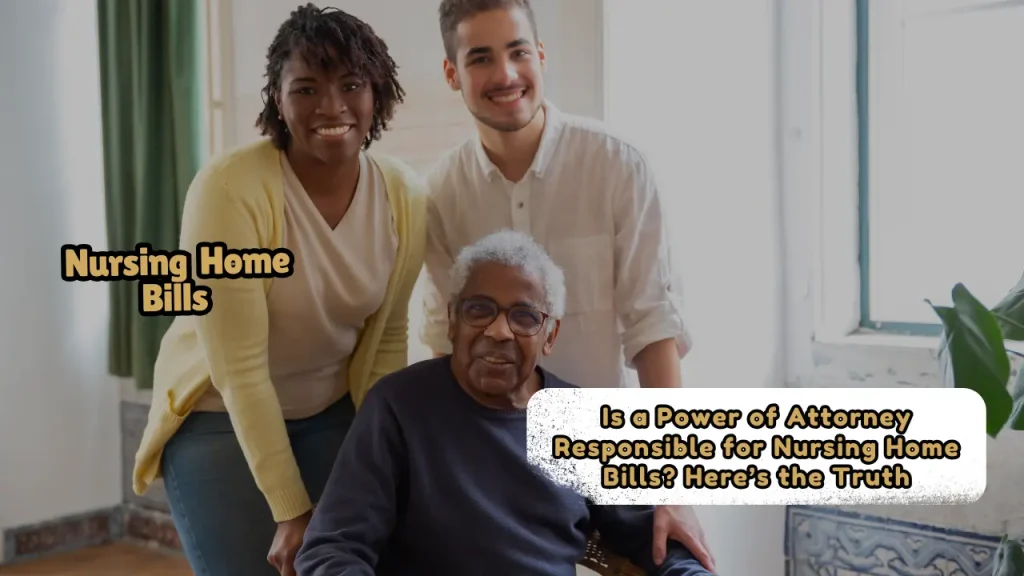Is a Power of Attorney Responsible for Nursing Home Bills? Here’s the Truth
No, a power of attorney (POA) agent is not personally liable for nursing home bills—as long as they act within their authority and avoid agreeing to pay with their own funds. Their role is to manage the principal’s finances, not to cover costs themselves.
Imagine This Scenario
Your loved one needs nursing home care, and you’re their POA. The bills start piling up—$7,500 a month or more, according to Genworth’s 2023 Cost of Care Survey—and you’re left wondering: Am I liable for this? It’s a common worry, but here’s the good news: You’re not on the hook, as long as you play by the rules. Let’s break it down so you can manage this responsibility with confidence.
Table of Contents
What Is a Power of Attorney?
A POA is a legal document where one person (the principal) grants another (the agent) authority to act on their behalf. Depending on the type, this could involve:
- Financial Decisions: Paying bills, managing accounts, or applying for Medicaid.
- Healthcare Choices: Deciding on treatments (though this doesn’t cover bills).
- Durable POA: Remains valid if the principal becomes incapacitated—critical for nursing home planning.
Your Role: Use the principal’s assets to pay their expenses, like nursing home bills—not your own. Think of yourself as a steward, not a bank.
Fun Fact: Over 1.3 million Americans live in nursing homes (CDC), and many rely on POAs to handle their affairs.
Are You Personally Responsible for Nursing Home Bills?
In most cases, no. POA agents are not liable for the principal’s debts. But there are exceptions where liability could sneak in:
1. Signing as a “Responsible Party”
Nursing homes often ask someone to sign admission forms as a “responsible party.” If you sign without clarifying your role as POA, you might accidentally agree to pay if funds run out.
- Federal Protection: Under 42 U.S.C. § 1396r, facilities can’t require this as a condition of admission.
- How to Sign Safely: Always write “[Your Name], POA for [Principal’s Name]” to avoid personal liability.
2. Mismanaging Funds
You must act in the principal’s best interest. If they have funds and you fail to pay bills, you could face legal action for breaching your fiduciary duty—though this doesn’t make you liable for the debt itself.
3. State Law Variations
- California: Probate Code § 4600 shields agents unless they act negligently.
- Florida: Statute § 709.2109 protects agents acting in good faith.
- Texas: Estates Code § 751.101 follows similar principles.
Real-Life Example: In a 2022 Florida case, a POA agent signed a nursing home contract without adding “as POA.” The facility sued her for $50,000 in unpaid bills. She won in court—but only after a costly legal dispute.
Related article for you:
Can a Power of Attorney Put Someone in a Nursing Home?

How to Protect Yourself as a POA
Avoid liability with these steps:
- Sign Correctly: Always include “as POA” on documents (e.g., “Jane Doe, as POA for John Doe”).
- Scrutinize Contracts: Cross out clauses implying personal liability in admission forms.
- Use Their Funds Only: Never dip into your own money—pay bills strictly from the principal’s accounts.
- Keep Records: Track every payment and decision to prove you acted responsibly.
Pro Tip: If a facility pressures you to guarantee payment, cite federal regulation 42 CFR § 483.15—it bans requiring third-party guarantees.
What If the Principal Can’t Pay?
Nursing home costs can exceed $90,000/year. If funds run low, your job is to explore alternatives—not pay out of pocket:
- Medicaid: Covers 60% of nursing home residents (Kaiser Family Foundation). Start applications early, as states like Ohio enforce a 5-year look-back on asset transfers.
- Veterans Benefits: The VA’s Aid and Attendance program helps qualifying veterans.
- Long-Term Care Insurance: Check if the principal has a policy.
Debunking Common Myths
- Myth: “I’m POA, so I have to pay if they can’t.”
Fact: You manage their assets, not your own. - Myth: “Signing admission forms makes me liable.”
Fact: Only if you sign personally, not as POA. - Myth: “They’ll evict my loved one if I don’t pay.”
Fact: Federal law (42 CFR § 483.10) protects residents during Medicaid pending status.
When Could a POA Get in Trouble?
Liability is rare but possible if you:
- Mix Funds: Combining your money with theirs invites legal scrutiny.
- Ignore Bills: Failing to pay when funds exist breaches your duty.
- Sign Incorrectly: Forgetting “as POA” can lead to lawsuits.
Stat: 30% of POAs aren’t sure about liability (2023 National Elder Law Foundation). Knowledge is power.
Key Takeaways
- A POA isn’t personally liable for bills—unless they sign as a guarantor or mishandle funds.
- Always sign as “POA,” avoid personal liability clauses, and use the principal’s resources.
- Medicaid and veterans benefits are lifelines when funds run low.
Final Thoughts: Protect Your Peace of Mind
Being a POA is about safeguarding your loved one’s care—not risking your finances. By signing smart, managing diligently, and knowing your rights, you can focus on their well-being, not the bills.
Need Help? Consult an elder law attorney for state-specific advice (e.g., California’s Probate Code § 4600). It’s worth the clarity—and your sanity.
Helpful Resources
- National Academy of Elder Law Attorneys: www.naela.org
- Medicaid Guidance: www.medicaid.gov
- AARP Caregiving Tips: www.aarp.org/caregiving
With the right strategy, you’ll handle nursing home bills like a pro—keeping your loved one safe and your finances secure.
About the Author

Sarah Klein, JD, is an experienced estate planning attorney who has helped clients with wills, trusts, powers of attorney, and probate matters. At All About Lawyer, she simplifies complex estate laws so families can protect their assets, plan ahead, and avoid legal headaches during life’s most sensitive moments.
Read more about Sarah
